#everything for elizabeth bennet
Explore tagged Tumblr posts
Text
Lizzie: Lydia has run off with Mr. Wickham, I fear we are to be ruined. I must go home.
Darcy: Would that I could
Darcy: Wait, it’s me I’m talking about, of course I can fix everything. Sit tight babe I got this
#incorrect pride and prejudice quotes#pride and prejudice#the lizzie bennet diaries#fitzwilliam darcy#pride and prejudice series#lizzie bennet#william darcy#elizabeth bennet#would that I could and then fixes everything
71 notes
·
View notes
Text
Mr Darcy to Elizabeth Bennet in the first half of Pride and Prejudice:

#pride and prejudice#mr darcy#elizabeth bennet#jane austen#shitpost#the song is grace kelly by mika but if you don't know that i feel sorry for you. ICONIC#i was blasting his first album in the car today and this line made an actual lightbulb appear over my head 💡#eventually everything comes back to pride and prejudice if you're autistic enough
41 notes
·
View notes
Text

“You have bewitched me, body and soul, and I love--I love--I love you. I never wish to be parted from you from this day on.” -Mr Darcy to Elizabeth Bennet
#pride and predjudice 2005#mr darcy#elizabeth bennet#i love them#favorite movie of all time#and out of everything#my comfort movie
12 notes
·
View notes
Text
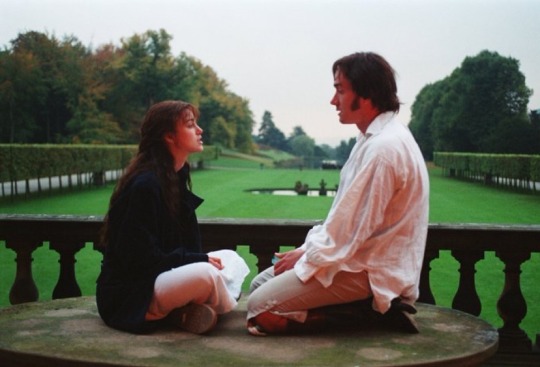
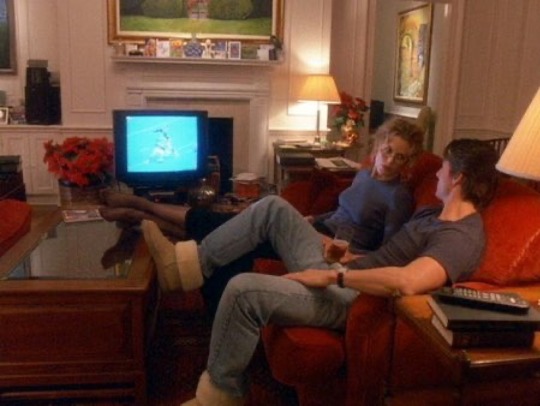



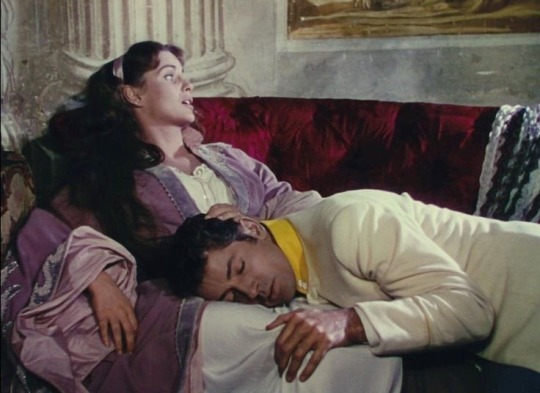
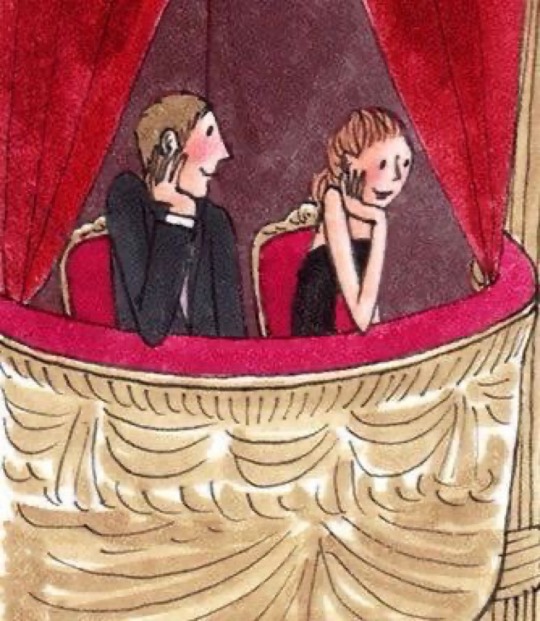



Facets of Romantic Love
The everyday mundanity
#web weaving#love#mundane#simple#simplicity#couples#beauty in the mundane#art#words#pride and prejudice#mr darcy#elizabeth bennet#past lives#Celine song#eyes wide shut#tom cruise#nicole kidman#when harry met sally#meg ryan#billy crystal#everything everywhere all at once#normal people#connell waldron#marianne sheridan#words words words#quotes#Spotify#facets of romantic love
8 notes
·
View notes
Text

painting studies
#digital art#fanart#pride and prejudice#keira knightley#pride and predjudice 2005#elizabeth bennet#sorry im just dumping my paintings here#painting study#this movie is everything to me#pride and prejudice ruined me#mr darcy
30 notes
·
View notes
Text
ethubs pride and prejudice au. etho = mr darcy, bdubs = elizabeth bennett. can anyone hear me
#ethubs#this has definitely been done before but i was just struck as if by lightning with the Vision#elizabeth/bdubs - headstrong and deeply caring and loves to be mad and is loyal to their families over everything#mr darcy/etho - aloof and kind of rude and awkward but probably just autistic. Lurks in social settings.#etho would def do the hand flex after helping bdubs onto a horse btw.#idk who the other characters would be but imo if we're going off of the 2005 p&p film adaptation then tango is mr bingley imo#doc is mr bennet and ren is mrs bennet just bc i think itd be funny#i need to watch the movie again and assign cubitos to all the characters just because.
14 notes
·
View notes
Text
Trying to Tread Water: Chapter Thirty-Three
The Elizabeth/Darcy Marriage of Convenience fic no one asked for
Chapter Thirty-Three: Lady Catherine might have claimed she'll never speak Elizabeth's name or acknowledge her as Mrs Darcy, but Elizabeth doesn't want her husband sundered from some of his only remaining family over insults that mean nothing to her. Along with Colonel Fitzwilliam, they plot how to reach out to Lady Catherine. Meanwhile, Mrs Gardiner continues to give sound romantic advice... only this time it involves Mary Bennet!
Read on Ao3 here
Some reviews of Chapter Thirty-Three: "Eeeeeeee! I've been catching up again, and it's been a bright light in my week omg. ... Love this, love your work, you're great! <3" "Oh no, I was binge-readimg the past few days, and finally caught up to the updates! I'm really enjoying this story and can't wait to see what happens next :)!"
Story updates on Ao3 fortnightly, with Chapter Thirty-Four coming out on the 28th June.
Story tags: Elizabeth/Darcy, Marriage of Convenience, Unrequited Love, Not Really Unrequited Love, Slow Burn, Pining, Pining Despite Being Married, Mr Darcy thinks his worst enemy is Wickham but maybe it's himself.
#yes i'm posting the tumblr update *checks calendar* 12 days late but shushhhhhhh#we're happy the fic always updates on time and everything else is a bonus haha#pride and prejudice#jane austen#elizabeth bennet#fitzwilliam darcy#mr darcy#elizabeth x darcy#darcy x elizabeth#writing#writers on tumblr#fanfic writing#fanfic#fanfiction#ao3#ao3 writer#ao3 fanfic#archive of our own#trying to tread water#fic:t3w
6 notes
·
View notes
Text
discord servers are not coming through on my request lesbian pride and prejudice aus
does anyone have any recs?
#pride and prejudice#I know people are big on the our dear couple and everything but come onnnn pleasaeaaeaase#elizabeth bennet#charlotte collins#anne de bourgh#caroline bingley#wlw#jane austen#femslash
1 note
·
View note
Text
Elizabeth's impatience to acquaint Jane with what had happened could no longer be overcome; and at length, resolving to suppress every particular in which her sister was concerned, and preparing her to be surprized, she related to her the next morning the chief of the scene between Mr. Darcy and herself.
"Pride and Prejudice" - Jane Austen
#book quotes#pride and prejudice#jane austen#elizabeth bennet#impatient#jane bennet#debrief#mr darcy#tell me everything
0 notes
Text
I'm not here to bash adaptations for the sake of it, as I tend to stick to praising what I like and permitting only things that bring me joy to take up my precious energy. Nor would I ever say that someone is in any way 'wrong' for enjoying a particular adaptation over another, or that they didn't 'understand' a novel (unfortunately such snobbery abounds in the Austen fandom).
However, I just returned from a screening of Pride and Prejudice (2005) and while there are a lot of things to enjoy about it, such as stunning scenery, beautiful atmospheric music and some great comedic performances... there are so many deviations from the novel that it really hampers my ability to fully enjoy it.
But none are as egregious in their alteration from the novel than Elizabeth's visit to Pemberley. The positives: the setting is gorgeous, and there's a sweet moment between Darcy and Georgiana... but other than that? It's difficult...
The Pemberley visit is so so important in how it allows the development of Elizabeth and Mr Darcy's relationship. I would argue the Pemberley arc, even more so than Darcy's letter, is crucial for Elizabeth in changing her opinion of him.
In the novel, this is illustrated in two key ways. Firstly, we hear Darcy's housekeeper, Mrs Reynolds, praise him highly to Elizabeth and the Gardiners; her testimony sows the seeds in Elizabeth's mind that, perhaps, she greatly misjudged Mr Darcy:
'He is the best landlord, and the best master,' said [Mrs Reynolds], 'that ever lived; not like the wild young men nowadays, who think of nothing but themselves. There is not one of his tenants or servants but will give him a good name. Some people call him proud; but I am sure I never saw anything of it. To my fancy, it is only because he does not rattle away like other young men.'
And then, Mrs Reynolds shows the visitors to the gallery where Elizabeth sees a portrait of Mr Darcy and can, for the first time, look at him without prejudice, having heard such a favourable account of him. The portrait makes a significant impact on Elizabeth, and it's the first time she really sees Mr Darcy in a positive light by allowing his gaze to fix on her via the portrait:
'The commendation bestowed on him by Mrs. Reynolds was of no trifling nature. What praise is more valuable than the praise of an intelligent servant? As a brother, a landlord, a master, she considered how many people’s happiness were in his guardianship!—how much of pleasure or pain was it in his power to bestow!—how much of good or evil must be done by him! Every idea that had been brought forward by the housekeeper was favourable to his character, and as she stood before the canvas on which he was represented, and fixed his eyes upon herself, she thought of his regard with a deeper sentiment of gratitude than it had ever raised before; she remembered its warmth, and softened its impropriety of expression.'
Unfortunately, the film completely misses the mark on both counts. For one, there is no portrait of Darcy. Instead, there is only a bust, and it's missing his eyes! I know that a sculpture was used due to Chatsworth having a sculpture gallery rather than a portrait gallery (and, look, I won't go on too much here but Pemberley is absolutely not Chatsworth. Not only is Chatsworth mentioned separately in the novel, but it's far too grand an estate for a man with an income of £10,000 per year!!) but it's the look in Darcy's eyes in his portrait, that finally softens Elizabeth's heart and begins the process of her falling in love.
I could perhaps forgive the portrait-sculpture switch, if we still had substantial dialogue to get the sense that Elizabeth's fondness for Darcy stems from the good account she hears of him rather than the grandness of his house. However, unfortunately, while Elizabeth is looking at the bust, we don't hear any of Mrs Reynolds' praise of him, only about his handsomeness, because there's music playing over it.
I cannot understand this creative choice. It's so crucial in gaining a sense of their relationship, of understanding Darcy's qualities that form the basis of Elizabeth's love for him. Her adoration is not driven by superficial attraction to a depiction of him, it's his generous nature that shifts her opinion and allows her to appreciate his appearance.
It's unfair to Elizabeth and to Darcy! It can easily make her look far more shallow than she is and it downplays the depths of Darcy's kind and generous nature. I wish, perhaps more than for any other scene in this adaptation, that this scene in particular was done differently. Otherwise, the audience misses out on the lovely depths of Elizabeth and Mr Darcy's dynamic!
#pride and prejudice#pride and prejudice 2005#jane austen#mr darcy#elizabeth bennet#text#my analysis#this scene disappointed me the most :((#and i couldn't wait to pull up quotes from the novel to articulate my points lol#anyway i did have fun and there was a lovely vibe in the cinema#great experience and i'm glad i went!!#but now i want to read the book. AGAIN.#and anyone watching this adaptation for the first time during its rerelease... PLS READ THE BOOK#you won't regret. it might be a struggle at first but i promise it's so worth it#it's so funny and dreamy and it's EVERYTHING
31 notes
·
View notes
Text
The way that Elizabeth Bennet is tricked by Wickham is so important because it's confirmation bias and we are all so susceptible to it. Of course Elizabeth ate up everything negative Wickham said about Darcy with a spoon, it's what she already thought! Wickham checked first. Once he knew Elizabeth hated Darcy, he fed her ego by letting her know that not only was she right, but she was special and smart for seeing through Darcy's wealth and status.
"The world is blinded by his fortune and consequence, or frightened by his high and imposing manners, and sees him only as he chooses to be seen." - Wickham, Ch 16
The world is blind, but not Elizabeth! Not with her supreme powers of perception and character reading. She sees the "real" Darcy...
And then of course, the best warning Elizabeth gets about Wickham (and I'll admit it's not a great one) is from Caroline Bingley, a woman she detests (I cut out the snobbery around it):
"Let me recommend you, however, as a friend, not to give implicit confidence to all his assertions; for, as to Mr. Darcy’s using him ill, it is perfectly false: for, on the contrary, he has been always remarkably kind to him, though George Wickham has treated Mr. Darcy in a most infamous manner. I do not know the particulars, but I know very well that Mr. Darcy is not in the least to blame; that he cannot bear to hear George Wickham mentioned..." Caroline Bingley, Ch 18
Elizabeth's judgment isn't perfect, it's highly subject to bias. Jane Austen's understanding of the human condition was amazing. She set Elizabeth's deception up in such an accurate way it could be in a modern social psychology textbook. Of course she believed Wickham; of course she discounted Caroline, it's human nature.
#jane austen#pride and prejudice#elizabeth bennet#confirmation bias#we love to be told we are right#it's our favourite thing as like a people
1K notes
·
View notes
Text
SUDDENLY I HAD A VALENTINE



𓏲𝄢 ⋆. ୨୧ ˚⋆ 𓏲𝄢
post prison!spencer x hopeless romantic! civilian!reader
masterlist | kofi
i’ve rejected affection for years and years, now I have it, and damnit, it’s kind of weird
Valentine, Laufey
summary: spencer reid isn’t a genius or renowned criminal profiler- he’s just the guy who frequents the same coffee shop you do; the guy you’re probably, maybe, a little bit in love with. But you’re not the kind of girl guys like him like— right?
cw: honestly genuinely cannot think of any this one is just soft and sweet (with a touch of angst bc it’s me)
tags/tropes: strangers to lovers, spencer is so whipped, reader is a hopeless romantic, spencer finds this cute, romance novel references (i have read a LOT of them), no colleen hoover jumpscares, however there are of ali hazelwood references bc Love Theoretically is my favorite romance book of all time
a/n: something short and sweet !! trying to get over my perfectionism by just posting <3
title taken from Valentine by Laufey (GO LISTEN TO LAUFEY)
𓏲𝄢
There’s a coffee shop within a twenty minute walk from your apartment that you like to go to. It’s more a cafe, really. They’ve got a little case with a small selection of pastries and such, as well as a nice, calm little atmosphere. Cozy.
You’d decided that you wanted to read more. You’d always enjoyed it, before—
Before. And now that you have more free time on your hands, you’d thought “what better time for some good old fashioned escapism?”
Your tbr pile was a mile long and you’d found the coffee shop and it seemed like a perfect little scenario.
That was probably about a year ago. Things are different now. Not in a bad way, just the way that things change as time goes on. You’d ended up moving apartments- somewhere smaller, but you’d gained a window that overlooks the street, so win, you’d switched jobs —you work from home now— and you’d kept your nose firmly away from any and all real life romantic endeavors.
Almost all of your friends you’d met through your ex. The unfortunate thing about that is when you broke up, they were more attached to him than you, so things got a little… lonely. You have other friends, of course, but most of them have busy lives— boyfriends, husbands, kids, successful jobs, travel. You text them when you can, hang out when they’re available, but you spend most of your day, everyday alone.
You’d struggled a lot, at first. But then you take a page out of all of your books: romanticize a quiet life.
You’d stared at your empty apartment, your new desk set up for your job and decided to romanticize the shit out of your new life.
It was slow going at first. You didn’t really know how to get started, what you wanted your life to look like, so the first few months were spent primarily on Pinterest. But ideas formed, plans were made, rooms were carefully designed and days were quietly spent.
Which leads you to where you are now: a mostly lone woman leading her ideal, romanticized life. Romance books, working from home, coffee shops and thrifted sweaters and everything on your Pinterest board. You’d picked up (and dropped) several hobbies, everything from scrapbook journaling to watercolor painting to simple embroidery and sewing. You adore the lopsided and ugly-cute DIY Jellycat rabbit (appropriately named Elizabeth Bennet.)
It’d taken a year, but you felt safe and comfortable again. And throughout this entire process, you still managed to avoid or kill any attraction you’ve had for any passing man.
Except Spencer, or as you’ve dubbed him in your head, Hot Coffee Shop Guy.
You only know his name because the barista’s call it out when he takes his coffee to go, which he doesn’t always do. Sometimes he takes his coffee or tea in the cafe, sits at the same table in the far corner (almost directly across from you, as you like to sit right next to the large windows at the front of the cafe) and read.
You and him read very different books. Sometimes he reads large, thick textbooks. Sometimes he reads dusty old books. Sometimes the things he reads aren’t even in English. A very stark contrast to your fine readings of Ali Hazelwood, Elsie Silver, and Anna Huang.
Ever since you can remember, you’ve had a thing for guys who read. Not casual reading, but reading-reading. And you can’t help but think you compliment each other in aesthetic— you with your brightly colored romance books and cozy clothes, soft and cute in that way that screams “I listen to Laufey”, and him with his old books and faint smell of pine and his button downs and grandpa cardigans, looking like he listens to Tchaikovsky and The Swan by Camille Saint-Saëns.
And it’s kind of fun to daydream about. You’d never act on it, of course, guys who look as hot as him don’t seriously go for girls like you, but it’s easy to read The Love Hypothesis and imagine yourself as Olive and him as Adam.
And then he starts saying hi.
Which, okay, admittedly, is not much. But besides the barista’s —whom he’s come to recognize and strike up conversations with— you’re the only person in the cafe he says hi too. Even though there are other regulars he no doubt recognizes.
Even when he takes his coffee to go, he gives you a little wave. It’s become your thing. A “hello” if he stays and a wave if he goes.
It’s a nice little thing to have, is the problem. Who doesn’t want a jaw-droppingly hot man to make time out of his day to say hi to you specifically?
But it won’t go anywhere. Even if you hadn’t sworn off love until you’re in your mid-thirties, you’d be too shy to actually do anything about it.
You’ve seen how this goes down. He waves, you smile, you work your way up to going up to him, and he either has a girlfriend or isn’t interested. And even if, for some reason he is interested, he won’t stay interested.
So there isn’t a point to entertaining it, but you still do.
It’s fun. A little change in routine. A star-burst of excitement in your usual unchanging schedule.
—
Apparently, just because you’ve sworn off romance, doesn’t mean the universe has sworn off romance for you.
You’re at the cafe as usual, book in front of you and scrapbook behind your coffee. You’re considering making a coffee ring stain page, but you’re worried about mold and the possibility of it ruining other pages.
It’s late evening, the usual time Spencer comes in, and you’d preemptively ordered a ham and swiss croissant because you tend to end up too self conscious to get up or move around too much when he sits down, which is stupid, because he isn’t even looking at you.
He walks in right after you sit back down from ordering, so you entertain yourself with Love On the Brain so you don’t catch yourself staring at the soft brown curls and light stubble on his jawline. It’s very addicting, staring at him. He just has one of those stupidly attractive faces that beg to be stared at.
Today, he offers you a little wave, dipping down to catch your vision and a little “good evening,” as he goes by.
Wow. A wave and a hello. He must be in a good mood.
One of the barista’s —Sarah, she has two cats— drops off your croissant and rushes away, a hand pressed to her mouth, which is odd. She usually lingers so she can show you new pictures of Tweedle Dee and Microwave (her two cat’s names, respectively.)
You look down at the plate and notice a little something sticking out under the croissant. It’s their business card, but it’s upside down, and something’s written on it.
You take the little piece of cardstock, carefully reading the words written in scrawling but strangely delicate handwriting:
You look really cute today.
-Spencer
Ho. Lee. Shit.
You stare at the card, reading it and reading it and reading it and reading it and reading it and then reading it one more time, just in case.
But the words don’t change.
You look up at him, face hot, and make eye contact with Spencer. Who’s looking right back at you, textbook open on the table in front of him and a small smirk on his face.
You look back down at the table.
See, you don’t really get flirted with often. Or ever, really. You’d grown up watching early 2000s rom-com’s and then started reading romance novels in late highschool, so the disappointing reality once you hit 20 that you’d never had a boyfriend and the most romance you experience is in your head was something you had to adjust to. You’d had crushes of course, but then never went anywhere. And the few times they did never ended well. Hence the total life makeover after you last break-up.
You’ve never really experienced cute romance. Nothing like looks across a cafe and notes passed by barista’s.
He doesn’t come over and strike up a conversation, which you’re thankful for. That would be too much. He goes back to his reading, and you press the note into the pages of your book and pretend to go back to yours.
You don’t end up doing much reading that day.
—
It becomes a new thing. The notes. He doesn’t write them all the time, and they don’t always come with whatever pastry you’ve ordered. Sometimes they’re tucked under your coffee on its saucer, sometimes he slips them silently onto your table. But you always tuck them into whatever book you’re reading, so the way it’s worked out is that there’s little pieces of Spencer spread throughout a good portion of the books you own.
I like your sweater.
I think that hairstyle suits you.
Maybe we should trade books one day. Any chance you can read French?
You always look so cozy in your little spot.
Have I ever told you I think you’re pretty? (Joking, I know I have, just wanted to say it again.)
You were right about those ham and swiss croissants.
How do you get your annotations to look so pretty?
I like it when you smile.
It’s a lot. It’s tempting.
The little notes and his smile have (pathetically easily) wormed their way into your affection. You’re both afraid to get more and unwilling to go back to your normal life. You should, by all means. Appreciate the notes and then let this entire thing sail right on by.
So you do exactly what you always do when something like this happens. Consult your friends.
“He’s been giving you notes?” Penelope gasps, hand on her chest, “Hot coffee shop guy has been giving you notes, flirty notes and you’ve haven’t given him a single one?”
“I’m nervous!” You exclaim, face hot. “There are so many ways this could go wrong, and not just romantically. What if I take off the rose colored glasses and there’s this… this person who isn’t at all like I thought he’d be?”
Her expression gets a little sad at your words, and she reaches across the table to take your hand. “Okay, first of all, I have never known you to wear rose colored glasses. You’re a romantic, but you’re also too logical for that. Secondly, and I’m saying this because I love you, you need to get over yourself.”
You blink. “What?”
“No, really! You’ve concocted this entire, horrific scenario in your head about this guy who you haven’t even officially spoken to. You’re getting waaaaay ahead of yourself.”
“I know,” You look down at the cup of coffee you’ve been sipping on. Coffee at your apartment isn’t as exciting as coffee from the cafe, but Penelope wanted to hang at your place to catch up when you called her. “But I just keep thinking- what if the same thing happens again?”
She rolls her eyes, but the action is fond. “And what if it doesn’t? You’ve gotta try, babycakes. That’s what the whole romance thing is about. Taking the risk.”
“But risks are scary.” You whine.
“They are,” She says, laughing now, “But they’re also fun. I think you should give it a shot. At least hear the poor man out before you condemn him to being an axe murderer.”
“I don’t think he’s an axe murderer,” You say, “I think he might secretly be a self absorbed dick.”
“Trust me. I’m pretty sure in this case, the chances of that are pretty low.”
—
The next time you go to the cafe, Spencer is in fact there. So you push through your racing heart and sweaty palms and all the thoughts in your head that scream that is a bad idea and you take the little folded piece of paper and ask the barista to give it to him with his coffee.
Your deliberated over what to write in the note for a long time. Probably too long considering the fact that if this goes well, you’ll be writing more. But in the end, your favorite pen in hand, you’d written out a simple little:
Hi. I think your sweaters look really nice too. ♡
You’d felt like you were back in elementary school— giggling and passing notes. Unlike elementary school, though, the note passing doesn’t end in mild humiliation or heartbreak.
When he gets the note, he looks up at you, the same surprised expression on his face that you wore when you’d received his note the first time. Then, he looks down, reads it, and you get the honor of watching the most kissable blush spread across his cheeks as he readjusts his sweater.
It becomes your little thing. Your new little thing.
It’s easy to slip into, this cute little routine with Spencer.
Penelope has other thoughts on the matter.
“Sweetheart,” She says, and you can’t see her expression over the phone, but you can picture the set of her brows and the downturn of her lips, “I’m so glad you took that first scary leap and sent him a note back. But it’s been a month. Don’t you think it’s time to pick up the pace?”
“I’m taking it slow.” You say, voice half muffled by your scarf. It’s getting colder and colder and you wish the cold snap would just snap and snow already. If it’s going to be freezing, it might as well be freezing and pretty.
“No, you’re stalling. I swear to you, if I don’t hear about a date by the end of this week I’m going to go down there and ask him out for you.”
“Well, we wouldn’t want that.”
“Exactly. Okay, I have to go. Love you bye!”
The dial tone sounds and you slide your phone into your pocket, further burying your face into your scarf.
You’re not really watching your surroundings as you approach the cafe, the walk too familiar, so when a hand larger than yours reaches for the door handle at the same time, you glance up in surprise.
“Sorry—“ Oh.
It’s Spencer.
He smiles at you, the same, really nice smile that you desperately want to kiss.
“Shame that our first official word together was ‘sorry’.”
You feel your face heat despite the chill outside. “Not true. I think it was actually hello.”
His smile widens. “Hello to you too.”
You blink. “Oh. Oh, I see what you did there.”
He nods to the door. “Do you want to head inside then? It’s a bit chilly out here.”
“Yeah,” A smile tugs at the corners of your lips. “Yeah, I’d really like that.”
He opens the door. “After you.”
So maybe taking the first leap won’t be that scary after all.
#girlblogging#dr spencer reid x reader#spencer reid x reader#spencer reid x you#spencer reid fluff#spencer reid x y/n#spencer reid fanfiction#spencer reid fanfic#spencer x reader#dr spencer reid#spencer reid#spencer reid imagine#spencer reid one shot#criminal minds x reader#criminal minds#criminal minds fanfiction#criminal minds fic#criminal minds imagine#criminal minds one shot
2K notes
·
View notes
Text
Something I just caught on my last re-listen to Pride and Prejudice: in Mrs. Gardiner’s letter, it’s brought up that Mr. Darcy deliberately avoids Mr. Bennet while in London.
“… Mr. Darcy’s next step was to make your uncle acquainted with it, and he first called in Gracechurch-street the evening before I came home. But Mr. Gardiner could not be seen, and Mr. Darcy found, on farther inquiry, that your father was still with him, but would quit town the next morning. He did not judge your father to be a person whom he could so properly consult as your uncle, and therefore readily postponed seeing him, till after the departure of the former.” (Chapter 52, emphasis mine)
This is not remarked on further in the text; Darcy doesn’t bring it up later and Elizabeth is more concerned with his rescuing Lydia than the fact that her father could have been spared a few days’ grief. This decision by Darcy, which I think must be the side effect of Austen’s careful timing of events (Austen gives so little detail in general in P&P that the constant notation of the passage of time is quite noticeable to me), is a rather dramatic demonstration of Darcy’s relationship with Elizabeth’s family, made more significant by the fact that Elizabeth is not directly witnessing it, but it’s left almost entirely unaddressed within text, left to the reader to figure out what it means. But I don’t know what it means! Here’s my propositions for why Darcy does this, in no particular order:
A) Darcy does not think Mr. Bennet is the proper person to consult because of the delicacy of the situation. He assumes that Mr. Bennet, due to fatherly affection for Lydia, would not be able to calmly and rationally deal with Wickham, but that Mr. Gardiner, as an uncle, would.
B) The same as above, but instead of fatherly affection, he thinks Mr. Bennet might act rashly or inappropriately as an aspect of his character. This is an assessment of Mr. Bennet’s character, but does not necessarily mean that Darcy thinks poorly of him.
C) Darcy does not think Mr. Bennet is the proper person to consult because they need to discuss money. He assumes that Mr. Bennet’s finances and/or attitudes surrounding money would hinder either Lydia’s settlement or the settling of Wickham’s debts and the purchase of his commission.
D) Darcy has had limited contact with Mr. Bennet and is simply uncomfortable with discussing things with him because they are only nominally acquainted; by contrast, he has had several conversations with Mr. Gardiner and likes him. The issue is him simply not knowing Mr. Bennet, rather than him knowing him well enough to think badly of him.
E) Darcy waits until Mr. Bennet has gone home out of a sense of protecting him/the need for him at Longbourn/not wishing to delay his journey.
F) Darcy already intends to hide everything from Elizabeth and believes that this will be impossible if he involves Mr. Bennet/he trusts Mr. Gardiner’s discretion.
G) Somehow, all of this relates to the fact that it’s Mr. Gardiner’s house. And this overrides the fact that this is Mr. Bennet’s daughter????
H) Darcy thinks of Mr. Gardiner as his friend and as a useful relative of Elizabeth, but Mr. Bennet he holds in less esteem. Both a bias for Mr. Gardiner AND one against Mr. Bennet.
I) He doesn’t want to have to explain himself to Mr. Bennet. He knows his actions will prompt speculation, knows that Mr. Gardiner already suspects something re: feelings for Lizzie so that ship has sailed, and he doesn’t need Elizabeth’s DAD poking his nose in!! Because he’d sniff him out.
I am very interested to know what people think!
263 notes
·
View notes
Text
I've been having more Pride and Prejudice thoughts, namely about Elizabeth's relationship with Lydia.
I've repeatedly come across the idea that Elizabeth is a bad sister to Lydia: that she judges her unfairly, disdains her instead of trying to advise her, victim-blames her for falling into Wickham's clutches, and ultimately abandons her.
Did these people read a different version of the book than I did? Or is this based on the adaptations? Or since everything they accuse Elizabeth of doing is really what Mr. Bennet does, are they somehow confusing her with her father?
Since when does Elizabeth never try to advise Lydia? We're told that both Elizabeth and Jane have often tried to advise Lydia and Kitty, without any success. Older siblings don't have the authority of parents, so as long as their mother encourages Lydia and Kitty's frivolous behavior and their father doesn't care, it's a lost cause. But it's not for lack of trying on Elizabeth and Jane's part.
As for unfairly judging and victim-blaming Lydia, I've been searching the text to find a place where Elizabeth does any such thing, but I haven't found it. The closest I can find is her speech as she tries to dissuade Mr. Bennet from letting Lydia go to Brighton, where she gives him a harsh assessment of all of Lydia's faults – her wildness, ignorance, vanity, flirting, and lack of any self-control – and warns him that if he doesn't check her, she'll disgrace the whole family. I do understand how some readers might call that monologue "mean." But Elizabeth isn't saying that Lydia was born that way and will always be that way. On the contrary, she's warning her father to start parenting Lydia as he should before her ways become fixed.
Elizabeth knows that Lydia is a product of her young age, her mother's spoiling, and her father's neglect. After the elopement, when Mrs. Gardiner is incredulous that Lydia would willingly live with Wickham out of wedlock, Elizabeth's explanation is that Lydia "is very young" and "has never been taught to think on serious subjects."
It's also made clear that Elizabeth pities Lydia and doesn't want her to have to marry Wickham. But she reluctantly realizes that there's no other way to save Lydia's honor or the rest of the family's. If any reader blames Elizabeth for hoping the marriage will take place and for her very bittersweet relief when it does, they're probably the same readers who hate Darcy for making the marriage happen. Never mind that Darcy tries at first to convince Lydia to leave Wickham instead, but Lydia won't listen.
The harshest thought ever expressed from Elizabeth's viewpoint toward Lydia post-elopement is when the newlyweds come back to Longbourn and Elizabeth is "disgusted" to see that Lydia has no remorse for what she put her family through. But isn't that fair?
I suppose some people will argue that Lydia has no reason to feel remorse because she "did nothing wrong." She's a "literal child," she's the victim of Wickham's predation, she believed he loved her and was always going to marry her, etc. But to be honest, I think Lydia's defenders sometimes tend to infantilize her. Is she really completely unaccountable for what happens? She's sixteen, not six, and without absolving Wickham of blame, he doesn't seem to have cold-bloodedly manipulated and seduced her the way he did Georgiana; it's implied that she threw herself at Wickham, that she was the one who wanted to elope, and since Wickham needed to flee from his gambling debts anyway, he essentially decided ""Sure, why not?" Just from living in society, Lydia should have known that running off with a man, giving him her virginity, and living with him before marriage would have threatened to disgrace her entire family. I don't think it's victim-blaming to admit that she does behave thoughtlessly and selfishly, even if we do understand that she's a product of her bad upbringing and that Wickham, Mr. Bennet, and Mrs. Bennet are more to blame than she is.
Last, but not least, since when does Elizabeth "abandon" Lydia? Do people who have only seen the adaptations assume that after Lydia and Wickham leave Longbourn, Elizabeth will have nothing more to do with her? The book makes it clear that once Elizabeth is married, she frequently sends Lydia money, that Lydia occasionally visits Pemberley too, and that while Darcy refuses to let Wickham visit, he does assist him in his profession to ensure that Lydia is provided for. How can anyone call that "abandonment"?
I understand why there's debate about whether Austen's narrative victim-blames Lydia or not. But I don't see where these "bad sister" accusations about Elizabeth are coming from.
318 notes
·
View notes
Text
UNTIL YOU'RE MINE
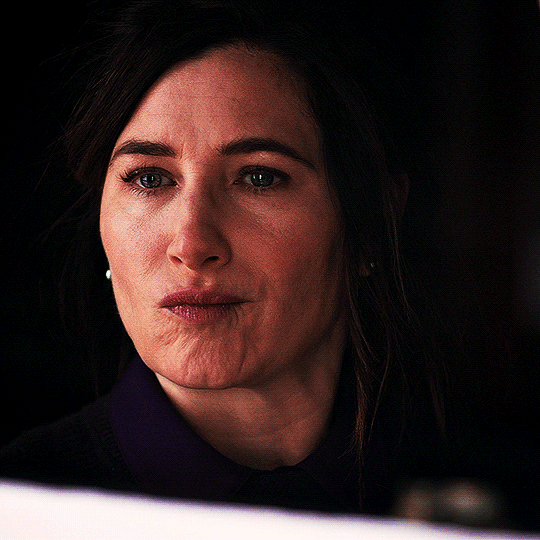
PAIRING: Teacher!Agatha Harkness x Student! Reader
SUMMARY: When your teacher becomes your nightmare.
WARNING(s): Dark Themes, Yandere, Kidnapping, Blood and Murder, Stockholm Syndrome
A/N: Been a while 😚🔪
You were sixteen the first time you saw her.
It was the start of the second semester, and you were assigned to a new English class—Advanced Literature. Room 207. A class meant for seniors and the academically gifted. You didn’t feel like either. You’d only gotten in because of your high reading scores and a transfer from your last school. A quiet, bookish girl who kept her head down, who blended in easily. You’d always preferred the silence of pages over people.
The bell rang as you stepped through the threshold. That’s when you saw her.
Ms. Harkness.
She stood at the front of the room, chalk in hand, already halfway through writing a quote on the board:
“We are all fools in love.” —Jane Austen
The first thing you noticed was how still she was—like a painting. She held herself with a kind of effortless elegance, tall and commanding in a dark plum blouse that hugged her figure, her black slacks sleek, polished boots clicking softly against the floor as she turned.
And then she looked at you.
A subtle flicker of her violet eyes over her shoulder, and the second her gaze met yours, your breath caught. There was something unreadable in her expression—something sharp and silent, like the moment just before lightning strikes.
Her stare wasn’t just a glance—it was assessing you, stripping you down to your bones and memorizing each one.
You froze in place.
She smiled.
“New student?” she asked. Her voice was smooth, honeyed, but there was something underneath it—a weight that felt too intense for a simple greeting.
You nodded. “Y-Yes.”
“Name?”
You told her, feeling like the sound of it no longer belonged to you.
“Lovely,” she murmured. “Why don’t you sit here?” She gestured to the front row, third seat from the left. Right in the center of her field of view.
It wasn’t a request.
You obeyed without question, feeling her eyes on your back the entire walk there. The other students were chatting, oblivious, but something inside you had already shifted. There was a tremble in your chest you couldn’t name.
You sat down, took out your notebook, and tried to focus. Tried to steady your breathing.
But Ms. Harkness didn’t look away.
The lesson that day was on Pride and Prejudice. You’d read it before. Knew all the characters. But the way she spoke about it made the book feel entirely new. Her voice was slow, deliberate, and she never once glanced at her notes. Every word she spoke felt chosen. Purposeful.
“Love,” she said, strolling between the desks with her hands clasped behind her back, “is often mistaken for admiration. Or obsession. Or control. But real love… it transforms you. It consumes you.”
She paused by your desk.
Her hand rested lightly on your shoulder. You froze again.
“Sometimes,” she continued, looking down at you with eyes like wine, “you don’t even realize you’re falling until it’s far too late.”
A few students chuckled. You didn’t. Your skin was burning under her touch, but her grip didn’t move. Not until you shifted uncomfortably in your chair.
Only then did she withdraw.
At the end of class, you were the last to leave. Your pencil case had spilled open, and you were scrambling to gather everything when her shadow loomed over your desk.
“You’re quite bright,” she said, crouching to help you collect your pens. “Your analysis earlier on Elizabeth Bennet’s pride… It was insightful. Very mature for someone your age.”
You gave her a quiet “thank you,” cheeks flushing. She was too close. You could smell her perfume—something floral, but dark, like night-blooming jasmine.
She handed you a pink gel pen you hadn’t noticed was missing.
“Don’t be afraid to speak more in class,” she said gently, brushing a stray lock of hair behind your ear. “I want to hear what’s in that pretty little head of yours.”
You nodded, almost dizzy from the attention.
She smiled.
You left the classroom feeling… strange. Not quite flattered. Not quite afraid.
Just noticed in a way you’d never been before.
That night, as you sat on your bed journaling, your thoughts drifted back to her. The way she looked at you. The way her fingers had lingered too long. You tried to tell yourself it was nothing—that you were being silly.
But deep down, something about that first glance stuck with you.
What you didn’t know was that hours later, Ms. Harkness was still in her classroom—alone, the lights dimmed, your name written over and over again in the margins of her notebook like a chant.
She didn’t go home.
She stayed there long into the night, whispering your name under her breath with a smile so soft it could be mistaken for love… if not for the madness shimmering beneath it.
The days passed quietly at first.
Ms. Harkness kept her distance, at least in the way most teachers did. No inappropriate comments. No touchy-feely gestures like that first day. But her attention never strayed far from you. She called on you often—always asking the most difficult questions. She said it was because you were “capable,” “gifted.” But her gaze never felt like it belonged to a teacher admiring talent.
It felt like a secret. A claim.
Every time you looked up, she was watching you. Not always directly. Sometimes through the reflection of the window. Sometimes from behind a book, her violet eyes just barely visible. But it was constant.
And soon, subtle things began to change.
Your essays always received glowing praise, even when you knew they weren’t your best. She began to write notes in the margins—not just about the text, but about you.
“You have such a sensitive soul.”
“Your mind is beautiful. I hope others recognize that.”
“This reminds me of a line I once underlined when I was your age—‘She walked through life as if the stars were her only companions.’ That’s you.”
You showed one of the notes to a friend once, laughing it off. But even as you smiled, something inside you twisted.
Then came the gifts.
Small things at first. A new journal left on your desk. A ribbon tied around it in your favorite color. A paperback book—The Bell Jar—with a note tucked inside the front cover:
“For when the world feels heavy. You’re not alone.” — A.H.
You never told her your favorite color. Or that you suffered from the occasional panic attack. But somehow, she knew.
When you brought it up after class—trying to politely return the journal—she merely smiled and said, “A teacher’s job is to nurture their brightest. I see you, sweetheart.”
She said it like a blessing. Like a vow.
You started to dread English class.
But skipping wasn’t an option. She always noticed. And the one time you were late because you had a nosebleed in the hallway, she showed up at the nurse’s office ten minutes later, eyes blazing with concern.
“She’s mine,” she hissed at the nurse when she tried to escort you. You saw it. Heard it. A quiet, deadly whisper she thought no one else caught.
You pretended not to.
Later that day, you found a packet of tissues and a bottle of herbal tea left inside your locker. No note. But it didn’t need one. You knew it was from her.
You started double-checking that your bedroom blinds were drawn at night. You couldn't explain why. It was just a feeling.
And then came the dream.
You were walking through a library alone. Shelves stretched up into the darkness like pillars in a cathedral. Every book you touched had your name on the cover.
And then she appeared behind you.
Her hand slid down your back—slow, warm, possessive. Her voice against your neck.
"Do you know how many versions of you I’ve read? How many I’ve rewritten in my head?"
You woke up sweating. Shaking.
Something was wrong.
The final straw was the email.
It came late—well past midnight. You checked it while lying in bed, groggy and half-asleep. The subject line read:
“My Dear Girl.”
Your heart thudded before you even opened it.
I know it’s not appropriate to write this. But I can’t help myself anymore.
You’re in my mind constantly. Every word I speak in class is for you. Every book I assign is because I want you to feel seen. Heard. Loved.
When I look at you, I don’t see a student. I see a soulmate who hasn’t yet remembered me.
Please don’t be afraid.
This is destiny.
Yours, always.
Agatha
You stared at the screen for what felt like hours. You didn’t breathe. You didn’t move.
The next morning, you didn’t go to school.
Your parents noticed your silence. You brushed them off. Said you were tired. That it was just “school stress.” But your hands kept shaking.
When you finally worked up the courage to show them the email, they both went pale. Your father called the school. Your mother held you tightly as you cried, whispering, “It’s okay now. We’ll protect you.”
The school promised action.
And for once… they followed through.
Within a week, Agatha Harkness was fired.
The official story was “boundary violations.” No charges filed. No police involved. The school didn’t want a scandal. They swept it under the rug with the efficiency of a place terrified of lawsuits.
But the day she was dismissed, she stood in the hallway outside your class.
She was wearing the same plum blouse from the first day you met her.
And she was smiling.
You stayed inside, heart pounding as you watched from the window. She didn’t yell. Didn’t weep. She simply placed a small envelope on the floor outside your door, turned slowly, and walked out of the building.
You never opened the envelope.
Your father burned it in the fireplace that night.
But even as the flames consumed the paper, and your parents held you in their arms, something inside you whispered:
It’s not over.
_-_-_
You didn’t sleep much after she was fired.
Even with the locks changed, even with your father installing motion-activated floodlights outside the house and your mother insisting you carry pepper spray, you couldn’t shake the feeling that she was close. Watching.
You’d flinch at the sound of tires on gravel. You started checking behind you in hallways, in parking lots, in the mirror. Every shadow stretched too long. Every stranger in the corner of your eye became her.
You kept telling yourself it was over.
But you knew better.
And so did your parents.
Because two weeks after she was fired, you found a bouquet on the front porch. Black dahlias. Tied with the same ribbon she once wrapped around the journal she gave you.
No card. No name. But you knew.
Your mother screamed when she saw them. Your father threw them in the garbage with shaking hands. That night, he filed for a restraining order.
The hearing was short.
You didn’t have to attend in person—just a signed statement. Your parents sat before the judge and presented the emails, the gifts, the testimony. The envelope. The flowers. It wasn’t hard to prove inappropriate conduct.
Agatha didn’t fight it.
In fact, she didn’t show up at all.
But as you would soon learn, that wasn’t mercy.
It was calm before the storm.
The order was granted. Agatha Harkness was forbidden to come within 500 feet of you or your home. She was not allowed to contact you in any form.
But that didn’t stop her.
It began subtly again.
You started seeing your name carved into things.
A bench at your bus stop, freshly etched with careful script: Y/N + A.H.
Your Instagram account—private—somehow had a new follower with no posts, no icon. The account’s name? ForeverHarkness.
Blocked.
Then came the voicemails.
The first was just breathing. A soft, almost lullaby-like hum in the background. You deleted it, hands trembling.
The second was worse.
“You’re confused right now. I understand. But I forgive you. I forgive your parents too… even though they’re trying to poison you against me. They don’t see you the way I do. They never did. You’re mine, little one. And I’ll wait. As long as I have to.”
You never gave her your number.
Your mother found you sobbing in your closet that night, curled into yourself like a frightened animal.
The next morning, you transferred schools again.
But it wasn’t far enough.
Agatha sent letters. Somehow she found your new campus. She started leaving gifts in your locker—no longer with love notes, but with old poetry torn from books:
“I cannot live without my soul.” – Wuthering Heights
“She is all things holy and unholy, and I will drink her like sin.” – Scribbled over in red ink
At this point, police were called. But the letters stopped before they could catch her. No fingerprints. No footage.
She was careful.
Too careful.
Your parents considered moving out of state. You begged them to. You begged.
But your dad insisted, “We can’t let her drive us out of our lives.” He stood firm.
You wanted to believe him.
But deep down, you felt it coming.
The night it happened, it rained.
You remember that detail more than anything. The sky split open like it was mourning before you even knew why.
You were in your room, headphones in, buried beneath a blanket, trying to disappear into music that didn’t remind you of her. Your parents were downstairs. Your little brother was watching cartoons in the living room.
Then—
A bang.
Not thunder.
A scream.
Then another.
You ripped off your headphones and bolted upright just as the lights went out. The entire house plunged into darkness.
You called for your dad.
No answer.
Called for your mom.
Nothing.
Then—footsteps.
Not heavy like your father’s.
Heels. Sharp and slow.
You panicked and ran—not outside. There wasn’t time. You ran into your closet and pulled the door almost closed, holding your breath.
And through the crack, you saw her.
Agatha.
Drenched from the rain, hair clinging to her face in wild strands. She wore black leather gloves and carried something long and gleaming—a knife. Her face was calm. Serene.
Like she was finally home.
She stepped over your father’s body first.
His blood stained the carpet. His eyes were still open.
You didn’t scream.
You couldn’t.
Your entire body had gone cold.
Your mother’s sobs came from the kitchen. Pleading. You heard a single word: “Please.”
Then—silence.
Followed by the sound of slicing.
Wet. Slow.
You wanted to close your eyes, but you couldn’t. You were frozen in a nightmare where you had to keep watching.
Your brother never even screamed. He was the last. You watched Agatha cradle his head like a mother might soothe a sleeping child.
When she finished, she stood in the center of your living room, slick with blood, and smiled.
“I told you,” she whispered to the dark. “They were in the way.”
You bit into your sleeve to keep from making a sound. You tasted blood—your own—where your teeth broke skin.
Then, suddenly, she stopped.
She tilted her head… as if listening.
Her gaze turned toward your room.
Your closet.
And she started walking toward it.
You never remembered how you escaped.
Not really.
The trauma split your memory in half, like a photograph soaked in bleach—faces smeared, sounds muffled, colors all turned gray. But pieces of it stayed with you. Forever.
The smell of blood.
The sound of wet footsteps squelching across your bedroom carpet.
The closet door cracking open just a few inches…
And her face.
Agatha's eyes had been wild with something almost… joyful. Like she’d finally peeled back the last page of a long-awaited story. There you were. Huddled inside the closet like a trembling paragraph she’d always known was hiding between the lines.
But something stopped her.
Maybe the distant echo of sirens. Maybe the sight of your tear-streaked face, paralyzed and bloodied from biting your own sleeve. Maybe it was enough, for now, just to see you watch her.
She didn’t pull you out. Didn’t speak.
She knelt slowly.
Placed her gloved hand on the closet door, just above your head.
And whispered.
“You’ll understand someday. I did this for you.”
Then she stood, turned—and vanished into the house.
By the time the police arrived, she was already gone.
You were the only one left alive.
The only one who saw everything.
Your parents.
Your little brother.
Slaughtered.
And you—
The hidden, haunted witness.
The courtroom was cold.
Almost too clean. Too bright. As if no evil could possibly exist in such a sterile space.
But when they brought her in—hands cuffed, orange jumpsuit too neat on her body—you felt the oxygen drain from your lungs.
She looked beautiful.
Not bloodstained. Not mad.
Beautiful.
Her hair was neatly pinned back. Her makeup light, tasteful. She looked like a version of herself you hadn’t seen in a year. The composed teacher. The poised intellectual.
But when she saw you…
Her lips parted into a soft, delighted smile.
Like you were a long-lost lover walking down the aisle.
You couldn’t look away.
You wanted to, but your body didn’t obey you anymore.
She mouthed two words across the courtroom.
Deliberate. Slow.
“My darling.”
Your hands trembled. A court officer touched your shoulder gently and whispered, “You don’t have to look at her.” But it was too late. Her image was already burned behind your eyes like a flashbulb.
You testified.
Through a locked jaw and a throat full of knives, you told them what happened. You told them everything.
The emails. The stalking. The flowers.
The night you saw her kill your entire family.
The jury never even debated for long. The evidence was overwhelming. The restraining order violation. The blood on her gloves. The flowers matched to the same rare nursery where she bought the black dahlias. Everything lined up.
She was sentenced to life in prison with no chance of parole.
And yet…
That final moment—before the guards dragged her away—unraveled everything.
She leaned forward as the verdict was read, her hands trembling with something between ecstasy and rage.
And she stared right at you.
“This isn’t over,” she said aloud.
“You’re mine. One way or another, I’ll have you.”
Court officers restrained her. The judge slammed the gavel. Your therapist cried. The newspapers printed your face under headlines like “Teen Survives Family Massacre” and “Killer Teacher Obsessed with Student.”
But none of that mattered.
Because her words stayed with you.
They grew roots in your chest. Coiled around your spine.
You weren’t just a survivor.
You were a promise.
Years passed.
You tried to move on.
You changed your name. You changed schools. You changed cities.
You stopped writing. You stopped reading. You stopped anything that made you remember her, which meant almost everything. You drifted through therapy like a ghost. Some days, you felt human again. Other days, you weren’t so sure.
And then… finally…
You met someone.
A girl named Elara.
She was everything Agatha wasn’t—soft-spoken, gentle, uncertain in her own way. She kissed you like you were made of glass, and you kissed her like you were trying not to shatter.
She never asked about the past.
Only the future.
You smiled when she called you hers.
You believed her when she said you were safe now.
You even agreed to go on that vacation with her and your friends. A quiet cabin, upstate. No signal. No noise. Just trees, water, sky.
You almost felt alive again.
You never expected the nightmare to crawl back from the grave.
The cabin was supposed to be an escape.
Nestled beside a glimmering lake in the woods, hours from any major city, it had no reception, no internet, and no past. Your friends insisted it would be healing. A clean slate. A few days with people who made you laugh, drink, dance, and forget.
And for a time, it worked.
Elara held your hand without expecting you to explain why your grip trembled. She knew enough to understand your ghosts had teeth. The others—Mika, Jules, and Aaron—respected the space around your silence.
There were s’mores. Laughter. Music that filled the trees.
The stars looked like diamonds that had forgiven the night sky.
You let yourself believe it was over.
You let yourself breathe.
Until the first night.
The first sign was the carving.
Aaron found it etched into a tree near the dock while looking for firewood. Letters carefully gouged into bark.
Y/N + A.H.
Forever. Even Death Can't Stop Me.
At first, they laughed. Said it must’ve been someone messing around. A coincidence. A joke.
But you froze.
Because you’d seen that same phrasing before. In a letter. In her voice.
And the carving was fresh.
Elara noticed your stillness and led you inside. “It’s nothing,” she whispered. “It’s someone else. It has to be.”
But that night, you barely slept.
The woods felt too quiet. Too aware.
The second sign was the phone.
Your old phone—the one you’d discarded years ago—was sitting on the windowsill the next morning when you woke up.
Dead. Cracked screen.
The wallpaper still the same: a photo of your family. From before.
And taped across it was a single line:
"You changed your name, but not your soul. I still know where you live."
You dropped it. Screamed. The others came running.
Jules wanted to call the police, but there was no service. Mika searched the woods. Found nothing. No footprints. No sign of entry.
“We’re miles from anything,” Aaron argued. “No way someone just walked up here in the middle of the night.”
But you knew better.
This wasn’t someone.
This was her.
That night, Mika didn’t come back.
She said she was going to the car for extra blankets. She didn’t answer when you called. The guys searched until dawn—up and down the dirt road, into the tree line, calling her name.
At sunrise, they found her.
Or what was left of her.
Face down by the lake. Throat slit. A flower in her mouth—black dahlia.
Just like before.
The rest of the day was a blur.
Jules vomited. Aaron wept. Elara held you like you were breaking in slow motion.
You wanted to believe this was a nightmare. You wanted to believe it was anyone else.
But you knew it was her.
Even after prison. Even after life without parole.
She had escaped.
She had found you.
And she was taking everything back.
You wanted to leave. But the car keys were gone. So was the gas can. Someone had sabotaged the tires—sliced clean through. And with no service, no signal, the woods may as well have been the moon.
Jules didn’t want to split up. Neither did Elara. But Aaron insisted they had to try hiking to the nearest ranger station—six miles through dense forest.
They left.
Only one of them returned.
Jules burst through the front door just before dusk, screaming, soaked in blood.
Not hers.
He collapsed in the living room, babbling nonsense, face pale, mouth open wide in a soundless scream.
Aaron, he said, had been hung like a puppet between two trees, his stomach carved open. Above his corpse, written in his blood:
“Tell them to stop taking what’s mine.”
You didn’t sleep that night. No one did.
You locked the doors. Nailed boards across the windows. Sat in the dark with a kitchen knife in your trembling hands.
Elara didn’t speak much. Her eyes kept flicking toward the window, as if she could feel her out there. Watching. Waiting.
When she did speak, it was a whisper against your skin.
“We should have stayed home.”
The next to die was Jules.
It was quick.
A scream from the bathroom. Then silence.
You and Elara ran in.
And all you saw was blood.
Every wall sprayed red. His body hanging over the tub, mouth full of teeth that weren’t his.
Your knees gave out.
You couldn’t scream anymore. Your throat was raw.
Elara pulled you away. Clutched you tight.
“We have to run,” she said. “Now. Before she gets you.”
You tried.
Together, you ran through the woods barefoot, clothes soaked from the storm, rain blinding your vision. Every snapping twig felt like a gunshot. Every rustle a whisper in her voice.
You didn’t know how long you ran. Minutes. Hours. Time unraveled.
And then, without warning—
Elara’s hand was ripped from yours.
You turned.
And saw her.
Agatha.
Drenched in mud, eyes glowing with madness, arms outstretched as she dragged Elara back by her hair, knife glinting between her fingers.
Elara screamed your name once—just once.
And then there was only silence.
You collapsed.
There was no fight left in you.
No running.
And that’s when she found you.
Agatha stepped into the clearing like a storm finally making landfall. Calm. Controlled.
Her hair was matted with rain. Her shirt soaked red. But her smile…
That smile had never changed.
“I told you,” she whispered, kneeling before you.
“One way or another, I’d have you.”
You sobbed. Not because of fear. Not anymore.
Because there was no one left to save you.
And she knew that.
You stopped counting the days.
After the fiftieth mark on the bedpost, it felt pointless. Time had lost shape. There was only before her… and after.
She was still careful with you. Still patient. Still obsessed.
But the madness had softened its claws. She no longer chained you with violence or threats. She didn’t have to.
Because your world was her now.
Each day followed the same pattern.
A soft knock. Breakfast. Books. Talks. Walks around the tiny greenhouse she’d grown just for you.
She sang sometimes. Old songs, lullabies, things you recognized from your childhood—though you never told her that.
Because the way she looked at you when you smiled…
It was terrifying.
But also… safe.
The outside world began to feel like a dream. A cruel one. Where your family died. Where your friends screamed. Where love was sharp and always out of reach.
Here, at least, you were wanted.
Here, you were the center of someone’s universe.
Even if that someone was deranged.
Even if it meant your past had to rot quietly in your mind.
It started with letting her touch your hair.
She asked, always. Gently. As though even now, she wanted your trust more than your submission.
And after so long in silence, so long buried in the cold tomb of your own isolation… you whispered, “Okay.”
She wept when you let her braid it.
Kissed your forehead.
Called you her girl.
The locket stayed around your neck.
You stopped trying to tear it off. Stopped staring at it with disgust. It became another part of the world you now lived in—just like the clean sheets, the soft music, and the quiet meals where she held your hand across the table.
One night, you whispered, “I don’t want to feel like this anymore.”
And she pulled you into her lap like a child.
Held you. Rocked you.
“Then don’t,” she said. “Let me do it for you. Let me be your anchor. Your only thing. You don’t have to remember pain anymore. Only me.”
And in that moment, something broke.
But something else… settled.
Months passed.
You laughed once.
A real laugh.
She was so stunned she nearly cried.
You read books out loud to her. You started sleeping beside her without needing her to ask. You dressed in the things she picked out for you. Let her call you sweetheart without flinching.
You never forgot what she did.
You never truly forgave.
But slowly, gently, the horror dulled. The grief hollowed into numbness. And her voice—always soft, always praising—became the one constant you could rely on.
One morning, she woke to find you standing over her.
Not in defiance.
Not in fear.
But with a question:
“Do you love me?”
Agatha sat up slowly. Studied you like you were something divine. Something she never deserved.
“More than my soul,” she said.
And when you crawled into her arms and whispered, “Then don’t let me go,”
she broke.
Cried into your skin.
Promised you would never be alone again.
Years passed.
The cabin became a home.
No one ever found you. She made sure of that.
And even if they had—you wouldn’t have left.
You didn’t know how to exist beyond her anymore.
The girl who once screamed in the dark was gone.
Replaced by someone who wore white for her.
Smiled for her.
Loved her the way she always wanted to be loved:
Completely.
Unquestioningly.
Forever.
In the end, she didn’t have to take you.
You gave yourself to her.
And that was all she ever needed.
_-_-_-_
Please don't forget to like, follow, reblog, and comment! 💜
#agatha harkness x reader#dark fanfiction#agatha all along#agathario#rio vidal#agatha harkness#agatha coven of chaos#agatha harkness fanfic#kathryn hahn#yandere#gxg
274 notes
·
View notes
Text
I've always liked the establishing character moments in the BBC version of Pride and Prejudice; e.g. Bingley is jolly and friendly but tends to be a little too reliant on Darcy's advice and approval; Darcy's rich and snobbish while also a good friend to Bingley; Elizabeth is cheerful and independent; Mr. Bennet is scholarly and clearly isn't that fond of his wife and younger daughters, but obviously loves Elizabeth, etc.
But I've only just now realised that Georgiana Darcy has three such moments.
The first is when Caroline is telling Jane via letter that the Bingleys are going to stay in London for a while, and that she's hoping that her brother will marry Georgiana. We've heard her mentioned before by Darcy, Caroline and Wickham; now we see her in person for the first time, standing arm in arm with her brother before confidently going to meet Bingley:
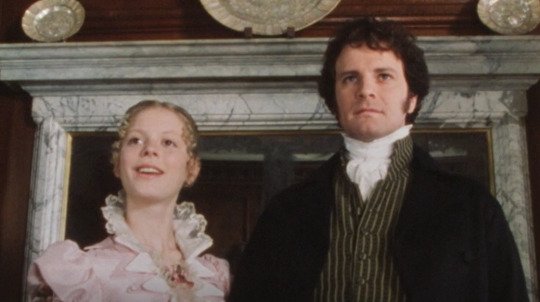
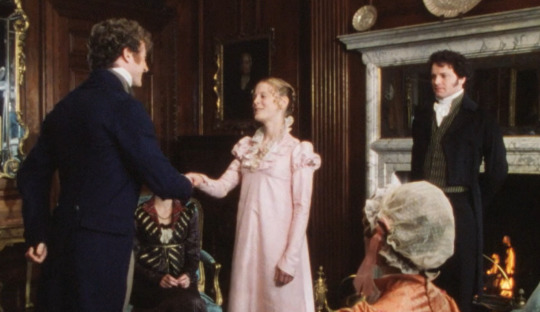
This is a really interesting moment, because it could be what happened in reality - but that's highly doubtful; Georgiana is far too confident here compared with what we see later in the story and it's very unlikely she'd be interested in a new suitor after what happened so recently with Wickham. Thus it's either Caroline playing up their meeting in her own mind, anticipating their courtship and marriage, or it's Elizabeth picturing what happened, fuelled by her own resentment of how Wickham was supposedly treated by the proud, selfish, unfeeling Darcys. So the first time we see Georgiana is deeply influenced by what two other very biased characters think they see.
The next moment is here:
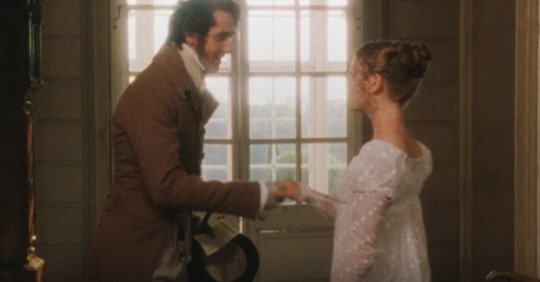
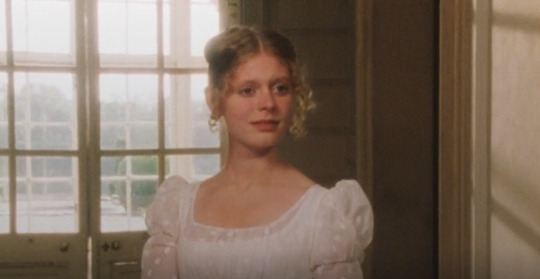
This time around Georgiana doesn't say a word or take the initiative; it's Wickham who takes her hand to kiss it, flirts excessively with her without saying a word, and strides off while she looks after him longingly, the beginnings of her smile fading as Darcy's handwriting takes over the screen. This is a rather biased moment as well; it's Darcy's flashback and he wasn't here for this bit, so he'd inevitably picture Georgiana as a sweet innocent completely swept off her feet by the charming man he so despises - but Darcy also knows his sister far better than Caroline and Elizabeth do, and she confesses everything to him once he discovers them at Ramsgate, so this is very likely how it went down in real life. And thus we get that much closer to the real Georgiana.
Finally, at the beginning of the fifth episode, we meet Georgiana in the flesh,
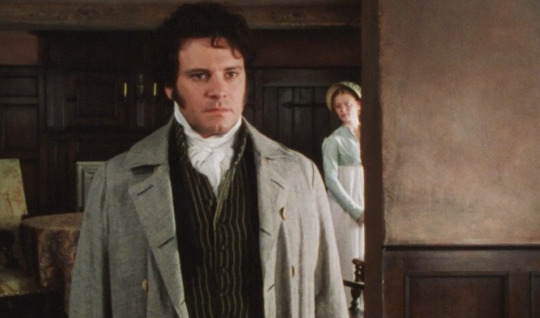
waiting nervously to be introduced,
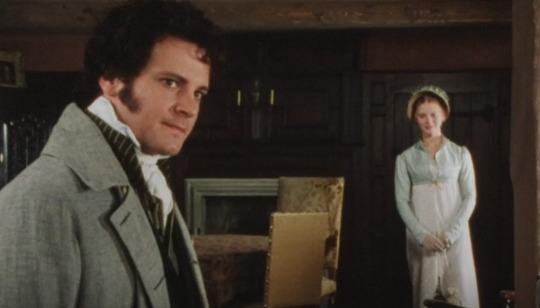
smiling as soon as Darcy steps aside,
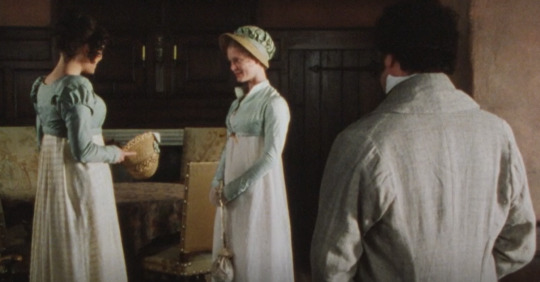
so nervous but so very pleased to meet Elizabeth,
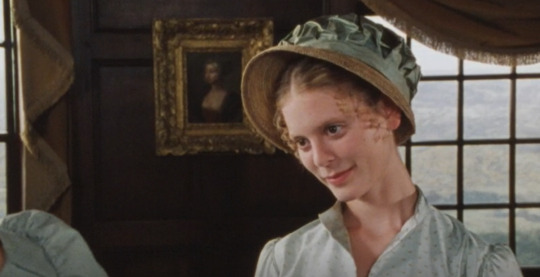
hesistant and selfconcious but very interested in learning more about Elizabeth, coming further out of her protective shell, full of love and praise for her brother, earnestly saying that she should have liked to have had a sister. And Elizabeth, like the audience, is charmed by the real Georgiana.
#bbc pride and prejudice#pride and prejudice#georgiana darcy#P&P#pride and prejudice bbc#jane austen#elizabeth bennet#fitzwilliam darcy#caroline bingley#charles bingley#george wickham#I really love analysing establishing character moments#Pride and prejudice 1995
513 notes
·
View notes